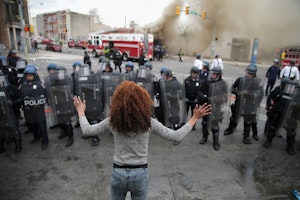Policing and the Future of Baltimore
By Evan Serpick

The trial of William Porter, one of six Baltimore police officers indicted on charges related to the arrest and death of Freddie Gray, is underway. Protesters outside the courthouse could be heard chanting “All night, all day, we will fight for Freddie Gray,” as they had through weeks of protests during the Baltimore Uprising.
Trials for the five other officers are expected to begin in quick succession in the coming months. In early 2016, the Department of Justice is expected to release the results of its “pattern and practice” investigation of the police department. And in November, Baltimore will elect a new mayor and city council.
“Everything is at stake. The future of the city is at stake,” Police Commissioner Kevin Davis, who has made considerable efforts to engage the community, told the Associated Press.
He’s right. The trials and the protests, along with these other key events in the coming months, will determine whether Baltimore begins the difficult task of dismantling the structural inequality generated and maintained by local law enforcement, among others—or returns to business as usual.
Freddie Gray’s death blew the lid off years of pent-up frustration with structural racism and inequality that has been churning in depressed Baltimore communities, which are almost entirely African American. The justice implications of those conditions are front and center every day in Baltimore. For example, Sandtown-Winchester, the neighborhood where Gray grew up, has a higher rate of incarceration—and more former inmates—than any other community in the state of Maryland.
These conditions have been present for years. But the uprising has forced an increasing number of people to work on solutions—particularly people in elected office and other key positions of power. Advocates who have been pushing reforms see new openings to challenge a criminal justice culture in Baltimore that feeds the cycle of mass incarceration and disenfranchisement.
The uprising has also emboldened a new generation of activists in Baltimore City. Some of them, including many Open Society Institute–Baltimore Community Fellows, were already working on these challenges, often at the margins and with little public or private support. They are now at the forefront, and seeing important but time-limited opportunities to leverage Baltimore’s “awakening” for lasting change.
The Open Society Institute–Baltimore is working with advocates to devise the best strategies to support these new opportunities and deepen investments in projects that are making progress. Over the next year, we plan to expand our work with the police department through the Center for Policing Equity and a project to divert drug users from the criminal justice system into community services, to begin a culture shift within the department. We’ll also work to educate state and local policymakers about policies that hinder officer accountability, like the Maryland Law Enforcement Officers’ Bill of Rights (the strongest in the country), as well as policies and training that can improve police accountability.
The trials, DOJ report, and elections won’t end Baltimore’s problems. But the next year could mark a turning point when efforts to reform Baltimore take shape, when elected officials, activists, community leaders, police, and all citizens collectively take advantage of the opportunity the uprising has offered and begin the difficult work of reform. The future of our city is at stake.
Until February 2023, Evan Serpick was program manager for the Open Society Institute–Baltimore.
